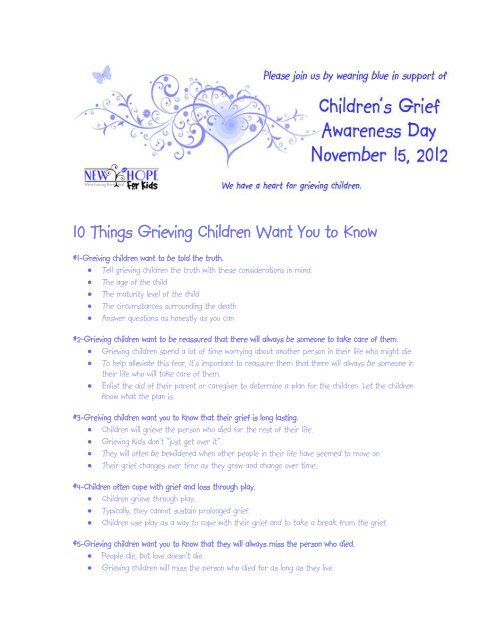10 Things grieving Children Want You to Know - New Hope for Kids
10 Things grieving Children Want You to Know - New Hope for Kids
10 Things grieving Children Want You to Know - New Hope for Kids
Create successful ePaper yourself
Turn your PDF publications into a flip-book with our unique Google optimized e-Paper software.
<strong>10</strong> <strong>Things</strong> Grieving <strong>Children</strong> <strong>Want</strong> <strong>You</strong> <strong>to</strong> <strong>Know</strong><br />
#1-Greiving children want <strong>to</strong> be <strong>to</strong>ld the truth.<br />
Tell <strong>grieving</strong> children the truth with these considerations in mind:<br />
The age of the child<br />
The maturity level of the child<br />
The circumstances surrounding the death<br />
Answer questions as honestly as you can<br />
#2-Grieving children want <strong>to</strong> be reassured that there will always be someone <strong>to</strong> take care of them.<br />
Grieving children spend a lot of time worrying about another person in their life who might die.<br />
To help alleviate this fear, it’s important <strong>to</strong> reassure them that there will always be someone in<br />
their life who will take care of them.<br />
Enlist the aid of their parent or caregiver <strong>to</strong> determine a plan <strong>for</strong> the children. Let the children<br />
know what the plan is.<br />
#3-Greiving children want you <strong>to</strong> know that their grief is long lasting.<br />
<strong>Children</strong> will grieve the person who died <strong>for</strong> the rest of their life.<br />
Grieving kids don’t “just get over it”.<br />
They will often be bewildered when other people in their life have seemed <strong>to</strong> move on.<br />
Their grief changes over time as they grow and change over time.<br />
#4-<strong>Children</strong> often cope with grief and loss through play.<br />
<strong>Children</strong> grieve through play.<br />
Typically, they cannot sustain prolonged grief.<br />
<strong>Children</strong> use play as a way <strong>to</strong> cope with their grief and <strong>to</strong> take a break from the grief.<br />
#5-Grieving children want you <strong>to</strong> know that they will always miss the person who died.<br />
People die, but love doesn’t die.<br />
Grieving children will miss the person who died <strong>for</strong> as long as they live.
<strong>10</strong> <strong>Things</strong> Grieving <strong>Children</strong> <strong>Want</strong> <strong>You</strong> <strong>to</strong> <strong>Know</strong> (continued)<br />
#6-Often, <strong>grieving</strong> children want <strong>to</strong> share their s<strong>to</strong>ry and talk about the person who died.<br />
Having an opportunity <strong>to</strong> tell his or her s<strong>to</strong>ry is often beneficial <strong>to</strong> a child’s healing process.<br />
Sharing memories about the person who died is also very important.<br />
Grieving children don’t want <strong>to</strong> <strong>for</strong>get the person who died- they are also worried that others will<br />
<strong>for</strong>get their person.<br />
#7-Every child grieves differently.<br />
Every child has his or her own grief journey and own way of <strong>grieving</strong>.<br />
Some children might be more expressive with their grief.<br />
Some children might keep it all in.<br />
Siblings grieve differently.<br />
Just because children come from the same family doesn’t mean that their grief will be the same.<br />
It is important <strong>to</strong> honor each child’s s<strong>to</strong>ry, even if it is different that his or her siblings s<strong>to</strong>ry.<br />
#8-Greving children often feel guilty.<br />
Grieving children will often feel pangs of guilt.<br />
Even if the guilt is not justified and has no basis in reality.<br />
#9-Even though I might be acting out, what I’m really feeling is intense emotions of grief.<br />
Grieving children frequently feel sad, angry, confused, or scared.<br />
Since they might not know how <strong>to</strong> express all of these emotions, they often end up acting out<br />
instead.<br />
#<strong>10</strong>-If you’re not sure what a <strong>grieving</strong> child wants, just ask him!<br />
When in doubt, ask a <strong>grieving</strong> child how you can help.<br />
Check in with the child-do they want <strong>to</strong> talk about the person who died? Maybe not.<br />
Expect myriad answers.<br />
Do they want <strong>to</strong> write about their grief or do some other activity <strong>to</strong> express their grief?<br />
What do they need?<br />
<strong>You</strong> can help <strong>grieving</strong> children by:<br />
<br />
<br />
<br />
<br />
<br />
<br />
Listening<br />
Really hearing them when you’re listening<br />
Following their lead<br />
Validating their feelings<br />
Answering their questions<br />
Seeking out additional resources, as needed<br />
Written by: Pamela Gabbay, M.A., FT, Program Direc<strong>to</strong>r, The Mourning Star Center <strong>for</strong> Grieving <strong>Children</strong> and Teens





